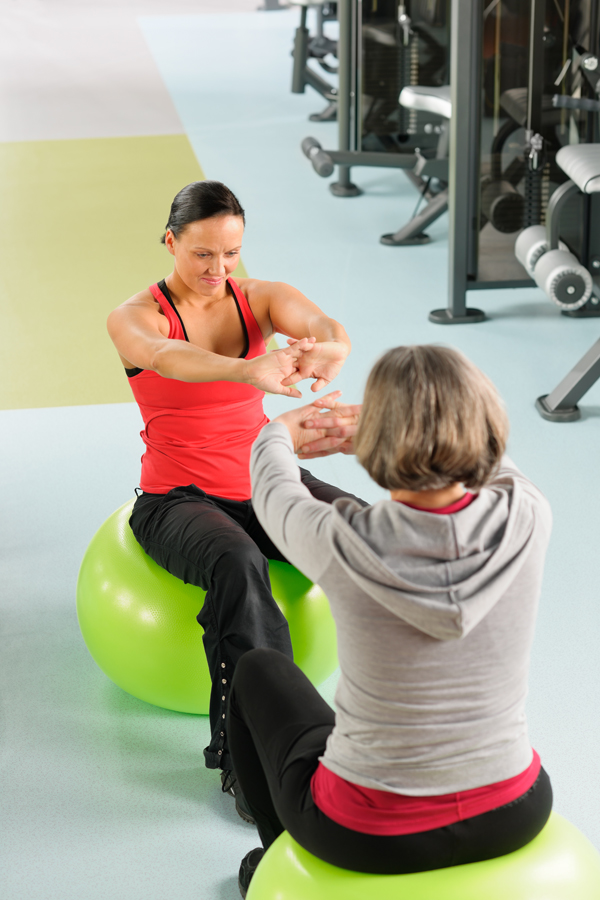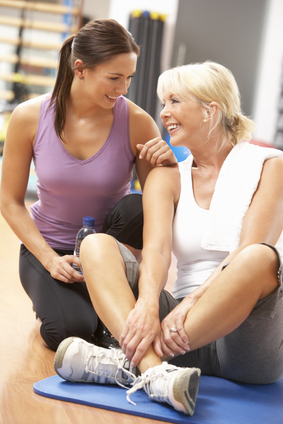Menopause is bad.
Exercise is good.
More exercise is the solution!
Is that it?
 It’s not quite that simple, although most things you will read will tell you that any form of physical activity is helpful. There is a lot of truth to it. Physical activity at any age is beneficial and for women during mid-life exercising carries additional substantial health benefits. The menopausal transition is associated with many health risk factors such as increased risk for cardiovascular disease, osteoporosis, decreased bone mineral density, metabolic syndrome, and musculoskeletal symptoms. Exercise prescriptions for those health risks are the same as for non-menopausal women.
It’s not quite that simple, although most things you will read will tell you that any form of physical activity is helpful. There is a lot of truth to it. Physical activity at any age is beneficial and for women during mid-life exercising carries additional substantial health benefits. The menopausal transition is associated with many health risk factors such as increased risk for cardiovascular disease, osteoporosis, decreased bone mineral density, metabolic syndrome, and musculoskeletal symptoms. Exercise prescriptions for those health risks are the same as for non-menopausal women.
However, according to my research, not all forms of physical activity are of equal benefit in helping with menopause symptoms. In fact, some forms of exercise can exacerbate certain types of symptoms such as hot flashes and insomnia.
I believe that it is important to pick the type of exercise depending on your symptoms rather than just exercise to exercise.
So how do you know which exercise is best for you? You start by reading this article! 🙂 To help you find your way through the labyrinth of research that is out there, I’ve consolidated the findings of the last 20 years of research on this topic so you don’t have to.
First I want to highlight the overall benefits of exercising regardless of symptoms…
Exercise Increases:
- Benefits brain function and functional capacity
- Increases beta endorphins
- Quality of Life
- Strength and balance
- Increased Bone Mineral Density
- Increase in quality and length of sleep
- Maintenance of healthy BMI
- Self-perceived physical condition
- Sport competence
- Body image & physical self-worth
Exercise Decreases:
- Vasomotor Symptoms
- Somatic & psychological symptoms
- Depression (1 exercise session/week = 22% reduction)
- Osteoporosis
- Body Mass Index
- Musculoskeletal symptoms
- Cardiovascular Disease (50% reduction)
- Overall mortality (20% reduction)
Exercise has many benefits but can also be stressful on the body.
Too much exercise and/or intensity can:
- Decrease sleep quality and length, which in turn is correlated with adverse physiological and psychological outcomes
- Increase circulating cortisol levels, which can lead to increased abdominal fat (read last week’s post for more info on this)
- Have negative effects on thermoregulation as it causes substantial increases in metabolic heat production and core temperature (during exercise, metabolic heat production can increase by ten to twenty-fold and recent studies suggest that hot flashes are triggered by small elevations in core body temperature)
Moderate intensity appears to have the most benefits…
- Highest menopause-specific quality of life
- Lowest number of symptoms
- Increased sleep, energy, confidence, mood
The following exercise guidelines are specific to helping you with menopause symptoms as well as increased quality of life throughout the menopausal transition. These recommendations do not apply to overall physical health.
Type of Exercise
- Endurance/aerobic training best for increased sleep
- Strength training for body image, strength, body aches
- Yoga for vasomotor (VMS) symptoms and overall menopause-specific quality of life (Hatha yoga for cognitive function (memory, concentration)
- Walking at ~3-3.5 mph for anxiety and depression
Duration & Intensity
- Moderate Intensity (60-70% Target HR)
- Min. 3 x week (more days = decreased severity of symptoms)
- Programs lasting at least 12 weeks
Special Considerations
- Keep body core temperature at comfort level to avoid increases in VMS
- Focus on activities that are enjoyable to you. Forcing yourself through workout regimens that you dislike can have negative effects on quality of life. I hear too many people say: “I think I should run more” and my question to them is “Why? Do you like running?”. “No, but it’s good for you”. Really? Is it? I don’t believe in doing things just because someone said they’re good, especially in regards to exercise. If you don’t like it, you won’t stick to it. It’s as simple as that. And when it comes to working out, consistency is the key. So find activities that you truly enjoy. Not only will you continue doing them and reap the physical and mental benefits but doing things you love will help you reduce stress and keep off that unwanted meno-pod (if you don’t know what a meno-pod is, you have to read last week’s post).
All information is based on peer-reviewed research. I usually add a reference list of all the articles I read to put together an article but this one would be way too long. If you’re interested in finding out more about specific research articles used for this blog, contact me.
Article reprinted with permission from Dr. Maria Luque.
Dr. Maria Luque is a health educator and fitness expert that specializes in helping women take charge of their own wellness. A native of Germany, she pursued a career driven by a passion for health and fitness. Dr. Luque currently teaches at the College of Health Sciences at Trident University International, in addition to conducting workshops, group/personal training, and writing. She’s an IDEA Fitness Expert and has been published in the IDEA Fitness Journal as well as appeared as a guest at local news channel to talk about quality of life and menopause. Visit her website, doctorluque.com

